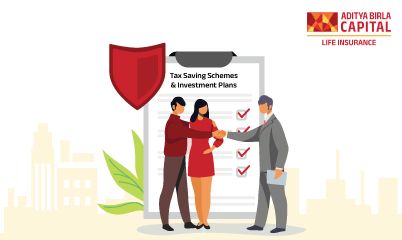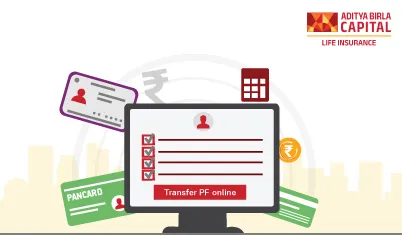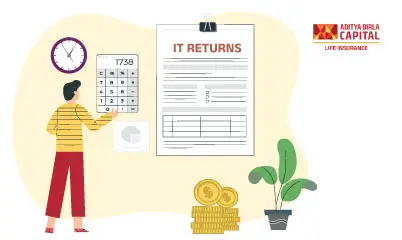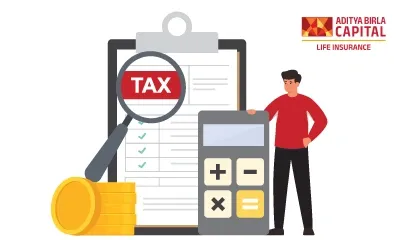Aditya Birla Sun Life Insurance Company Limited
Easy Ways to Maximize Your Tax Savings

Plan Smarter, Live Better!

Thank you for your details. We will reach out to you shortly.

Currently we are facing some issue. Please try after sometime.


- Table of Contents
Have you ever thought about saving money on taxes at some point in your life? Or have you ever wondered how to achieve that? If so, chances are you have looked into various tax strategies and found them lacking. It's true that whenever you save money on taxes, it will make your life better and make it easy to maintain your financial health. These smart tips can help them save money on taxes.
Why is Tax Saving Important?
Income tax has become a vital requirement to ensure that a nation's government functions correctly and provides the assets that its citizens require. As a consequence, income taxes should be considered a responsibility to fulfil rather than a load to bear.
Each tax season, Indian taxpayers must confirm that their appropriate tax forms are completed and that the correct amount of taxes are paid. Take into account, however, that the Indian government has also established some methods that allow taxpayers to execute their own activities and drastically cut their taxable income. Therefore, as a taxpaying individual, You should be concerned about both overpaying as well as underpaying your income tax portion. As a consequence, the content and benefits of tax benefits3 should always be included in your yearly tax return filing process.
Early in one's career, it is common to neglect tax savings as an essential component of their income tax approach. The benefits of tax breaks may look minor. This, however, may commonly develop a negative tendency in the ensuing years.
As your individual career progress and your overall income grow, tax savings must constitute a substantial component of your tax proposal each year. Greater income tax rates apply to higher earnings. Therefore, it's a smart idea to save a considerable amount of your hard-earned cash. As a consequence, the necessity of making crucial decisions that might decrease your tax liability in the coming years should be reinforced as early as possible in your professional life.
Tax Saving Tips
Here are some tips that can help you receive tax breaks:
1. Home Loan:
When you are structuring your home loan, you can avail yourself of the benefits offered by Section 80C of the Income Tax Act. This will help you receive tax deductions up to INR 1,50,000 on the principal loan amount as well as INR 2,00,000 on the amount of interest paid under Section 24.
2. Saving Account Interest Earnings:
Interest earned from saving accounts is usually tax-exempt up to a limit of INR 10,000. The same threshold is raised up to INR 50,000 for senior citizens under Section 80TTB. This limit is applied to the total of all savings accounts of the individual.
3. NRE Account Interest:
NRE account holders are Indian citizens who currently don’t reside in the nation. They receive interest earnings from both fixed deposits and accumulating amounts. The amount of interest earned is tax-free.
4. Life Insurance Policy:
Section 10 exempts the maturity sum from the individual's income tax liability given that the insurance premium is less than 10 per cent of the total guaranteed4 (if the insurance policy is bought after 1st April 2012). For plans obtained before this time, the maturity sum is free from taxation if the insurance premium is 20 per cent of the total guaranteed4. This group also includes policies acquired after 1st April 2013 that insure the life of an individual with a handicap or a condition listed under Income Tax Act Sections 80U or Income Tax Act Section 80DDB, respectively. If the insurance premium is less than 15 per cent of the total insured, the amount paid at maturity is free from taxation.
5. Scholarships:
Scholarships are awarded to some deserving students in order to assist them in coping with their educational expenses. Section 10(16) provides that this scholarship money is tax-free income.
6. Equity or Equity MF Gains
Equities or Equity Mutual Funds are an important part of almost everyone’s investment portfolio. However, these investment instruments can provide tax deduction up to INR 1,00,000 if they are kept for at least a year and then sold.
7. NPS Contributions
Section 80C of the Income Tax Act offers tax deduction up to a limit of INR 1,50,000 on contributions made to the National Pension Scheme. This is yet another important investment route for individuals looking at a long-term investment horizon.
8. Provident Fund Interest:
Any interest earned on an ongoing provident fund is exempt from taxes.
9. Education Loan:
Due to the ever-increasing cost of higher education, education loan is becoming a new norm for students in the nation. However, students need to be aware that the amount of interest paid on the student loan is not subject to taxation under Section 80E. There is no limitation on this amount.
10. Health Insurance Policy:
Policyholders of an ongoing health insurance plan may be eligible for tax breaks on the sum of premiums paid under Section 80D of the Income Tax Act. The limitation is established at INR 25,000 for customers under the age limit of 60, while it is enhanced to INR 50,000 for those beyond the age limit. Tax deductions of up to INR 5,000 are available in both situations for preventative healthcare examinations.
11. Specific Medical Condition Expenses:
Section 80DD of the Income Tax Act offers tax benefits3 to individuals paying expenses to treat their disabled dependents. The limit is set up to INR 75,000 for a 40% disability and up to INR 1,25,000 for patients with 80% or more disability. There is no age or expense restriction on this tax break. Section 80DDB also specifies some diseases whose treatment can provide an individual with tax deductions subject to certain conditions and limits.
12. Donations:
Donations made to certain relief funds and charitable organisations are deductible under Income Tax Act Section 80G. Section 80GGC applies tax breaks for funds spent on a political party donation. These deductions have no maximum limit. A contribution of this size entitles the donor to a full tax deduction under Sections 80GGC and 80GGB for individuals and companies, respectively.
13. Travel Expenses for Businesses:
Businesses can opt to claim their travel expense as a component of their business costs in order to avoid paying taxes on them.
The Bottom Line
Saving money on taxes doesn't have to be complicated - by following these 13 smart tips, you can seriously reduce your tax bill, keep more cash in your pocket, and give yourself a financial boost!
Thank you for your details. We will reach out to you shortly.
Thanks for reaching out. Currently we are facing some issue.
Buy ₹1 Crore Term Insurance at Just ₹575/month1
ABSLI DigiShield Plan
Life cover up to 100 years of age.
Joint Cover Option
Inbuilt Terminal Illness Benefit
Tax Benefit^
Return of Premium Option~
Life Cover
₹1 crore
Premium:
₹575/month1
Most Popular Calculator
Guaranteed returns after a month¹







